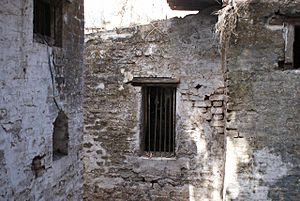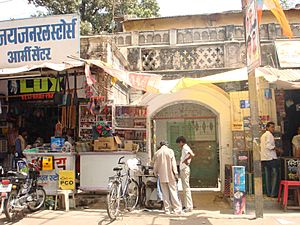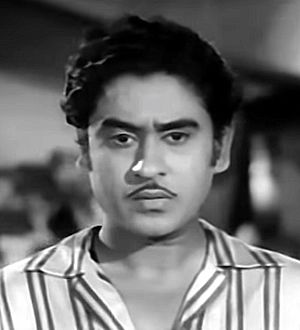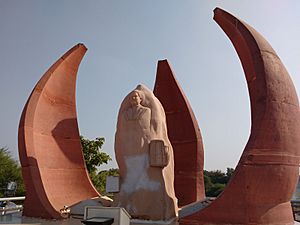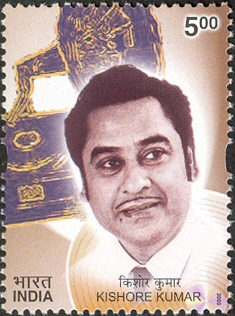Kishore Kumar facts for kids
Quick facts for kids
Kishore Kumar
|
|
|---|---|
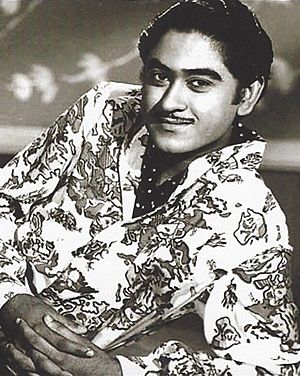 |
|
| Born |
Abhas Kumar Ganguly
4 August 1929 |
| Died | 13 October 1987 (aged 58) |
| Nationality | Indian |
| Other names | Kishore Da |
| Occupation |
|
| Years active | 1946–1987 |
|
Notable work
|
As an actor -
|
| Spouse(s) |
Ruma Ghosh
(m. 1950; div. 1958)Yogeeta Bali
(m. 1976; div. 1978)Leena Chandavarkar
(m. 1980) |
| Children |
|
| Relatives | See Ganguly family See Mukherjee-Samarth family |
| Awards |
|
| Musical career | |
| Genres |
|
| Instruments | Vocals, Piano |
| Signature | |
 |
|
Kishore Kumar (born Abhas Kumar Ganguly; 4 August 1929 – 13 October 1987) was a famous Indian playback singer and actor. He is known as one of the greatest and most important singers in Indian music history.
He was very popular in the Indian subcontinent. People loved his unique yodeling style and his ability to sing in many different voices. He sang in various music styles. His brother, the famous actor Ashok Kumar, said Kishore's voice was special because it hit the microphone perfectly.
Besides Hindi, he sang in many other Indian languages. These included Bengali, Marathi, Assamese, Gujarati, Kannada, Bhojpuri, Malayalam, Odia, and Urdu. He also released non-film albums, especially in Bengali, which are still loved today.
Kishore Kumar won 8 Filmfare Awards for Best Male Playback Singer. This is a record for the most wins in that category. In 1985, he received the Lata Mangeshkar Award from the Madhya Pradesh government. In 1997, the Madhya Pradesh Government started the "Kishore Kumar Award" to honor contributions to Hindi cinema. In 2012, his last unreleased song sold for a lot of money at an auction in New Delhi.
Contents
- Early Life and Family Background
- Starting His Career in Music and Films
- Developing His Unique Singing Style
- Working with Music Directors
- Kishore Kumar's Acting Career
- Singing Success in the 1970s and 1980s
- Later Years and Collaborations
- Personal Life and Quirks
- Death and Lasting Legacy
- Awards and Recognition
- See also
Early Life and Family Background
Kishore Kumar was born as Abhas Kumar Ganguly in Khandwa, which was then in the Central Provinces (now Madhya Pradesh). His family was Bengali. His father, Kunjalal Ganguly, was a lawyer. His mother, Gouri Devi, was a homemaker from a rich Bengali family. Kishore was the youngest of four children. His older siblings were Ashok Kumar, Sati Devi, and Anoop Kumar.
When Kishore was a child, his brother Ashok became a famous actor in Hindi cinema. Later, Anoop also started acting with Ashok's help. Kishore went to Christian College in Indore.
Starting His Career in Music and Films
After Ashok Kumar became a film star, the Ganguly family often visited Bombay (now Mumbai). Abhas Kumar changed his name to 'Kishore Kumar'. He began his film career as a chorus singer at Bombay Talkies, where his brother worked.
Music director Khemchand Prakash gave Kishore his first chance to sing "Marne Ki Duayen Kyon Mangu" for the film Ziddi (1948). After this, he got many more singing offers. However, he was not very serious about a film career at first. In 1949, he moved to Bombay permanently.
Developing His Unique Singing Style
Early in his career, Kishore Kumar was inspired by singer K. L. Saigal. He copied Saigal's style in some of his first films. But later, he created his own special way of singing. He greatly respected the poet and musician Rabindranath Tagore, who influenced him a lot.
Kishore was also a big fan of Hollywood actor-singer Danny Kaye. He even had pictures of these three people in his home and would bow to them daily. He was also influenced by playback singer Ahmed Rushdi. Kishore even sang some of Rushdi's songs at the Royal Albert Hall in London as a tribute.
Kishore Kumar often used yodeling in his songs. This style became a key part of his singing. He got the idea from listening to Jimmie Rodgers and Tex Morton. Some famous songs where he yodeled include Yeh dil na hota bechara and Zindagi ek safar hai suhana.
In the movie Half Ticket, for the song "Aake Seedhi Lagi Dil Pe," the music director Salil Chowdhury wanted a duet with Kishore and Lata Mangeshkar. But Lata Mangeshkar was not in town. Kishore solved this by singing both the male and female parts himself. He did it so well that it sounded like two different singers.
Working with Music Directors
Music director S. D. Burman was one of the first to see Kishore's singing talent. He heard Kishore imitating K. L. Saigal and told him to create his own style. Kishore then developed his unique yodeling style. S. D. Burman helped Kishore a lot, especially in the late 1950s and early 1960s. He made Kishore sing for actor Dev Anand in many films.
Some popular songs they created together include "Maana Janaab Ne Pukara Nahin" from Paying Guest (1957) and "Ek Ladki Bheegi Bhaagi Si" from Chalti Ka Naam Gaadi (1958). Kishore also sang many duets with Asha Bhosle for S. D. Burman.
Kishore also worked with other famous music directors. C. Ramchandra composed "Eena Meena Deeka" from Aasha (1957). Shankar Jaikishan created "Nakhrewaali" from New Delhi (1956).
In 1968, R. D. Burman worked with Kishore on the film Padosan. Kishore sang "Mere Saamne Wali Khidki Mein" and "Kehna Hai." Padosan was a comedy where Kishore played a musician. A funny part of the film was a musical contest between Kishore, Sunil Dutt, and Mehmood Ali.
In 1969, director Shakti Samanta made Aradhana. Kishore sang three songs: "Mere Sapnon Ki Rani," "Kora Kagaj Tha Ye Man Mera," and "Roop Tera Mastana." These songs made him a top playback singer in Hindi cinema. Kishore won his first Filmfare award for "Roop Tera Mastana."
Kishore Kumar's Acting Career
Kishore Kumar's first film role was in Shikari (1946), where his brother Ashok was the lead actor. Kishore played the main role in Andolan (1951). Even though he got acting jobs with his brother's help, he was more interested in singing. But Ashok wanted him to be an actor.
Between 1946 and 1955, Kishore appeared in 22 films. Many of them were not successful. He sometimes tried to get fired from films because he didn't want to act. But after successful films like Naukari (1954) and Baap Re Baap (1955), he became more serious about acting.
He starred in Bimal Roy's Naukari (1954) and Hrishikesh Mukherjee's first film, Musafir (1957). His most successful period as an actor was from 1954 to 1966. He had big hits when paired with actresses like Mala Sinha and Madhubala.
His own film, Chalti Ka Naam Gaadi (1958), featured all three Ganguly brothers and Madhubala. Kishore played a car mechanic. He also acted in and composed music for Jhumroo (1961). He even wrote the lyrics for its title song. Later, he produced and directed Door Gagan Ki Chhaon Mein (1964). In this film, he played a father to a deaf and mute son, played by his real-life son Amit Kumar.
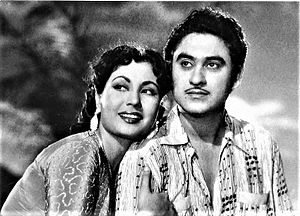
After 1966, his films were not as successful. He also faced some financial problems. He produced and directed a few more movies in the late 1970s and early 1980s. Chalti Ka Naam Zindagi (1982) was his last film as an actor.
Singing Success in the 1970s and 1980s
Kishore Kumar was a top singer throughout the 1970s and 1980s until he passed away in 1987. He sang the most songs for actor Rajesh Khanna, with 245 songs across 92 films. This is a record for a singer-actor pair. He also sang many songs for Jeetendra, Dev Anand, and Amitabh Bachchan.
He continued to work with S. D. Burman on songs like "Phoolon Ke Rang Se" from Prem Pujari (1969). R. D. Burman also recorded many hits with Kishore in the 1970s. These include "Yeh Shaam Mastaani" from Kati Patang (1971) and "Chingari Koi Bhadke" from Amar Prem. Even though Kishore didn't have formal classical music training, R. D. Burman often had him sing semi-classical songs.
Kishore also sang many duets with Asha Bhosle and Lata Mangeshkar for R. D. Burman. Examples include "Panna Ki Tamanna" from Heera Panna (1973) and "Rimjhim Gire Sawan" from Manzil (1979).
Besides the Burmans, Kishore worked with other famous music directors. The duo Laxmikant–Pyarelal composed many songs for him. These include "Mere Mehboob Qayamat Hogi" from Mr. X in Bombay and "Yeh Jeevan Hai" from Piya Ka Ghar. They also worked with Kishore and Mohammed Rafi on duets.
Salil Chowdhury recorded songs like "Koi Hota Jisko Apna" from Mere Apne. Ravindra Jain recorded "Ghungroo Ki Tarah." Kalyanji–Anandji also had many hits with Kishore, such as "Zindagi Ka Safar" from Safar and "Pal Pal Dil Ke Paas" from Blackmail.
Kishore also worked with Rajesh Roshan and Bappi Lahiri. For Rajesh Roshan, he sang "Chhookar Mere Man Ko" from Yaarana. With Bappi Lahiri, he recorded "Pag Ghunghroo Bandh" from Namak Halaal (1982) and "Manzilen Apni Jagah Hai" from Sharaabi (1984).
During the Indian Emergency
During a time of national emergency in India (1975–1977), Kishore Kumar was asked to sing at a political event. He refused. Because of this, his songs were temporarily banned from being played on government radio and TV channels from May 1976 until the emergency ended.
Later Years and Collaborations
Kishore Kumar's son, Amit Kumar, also became a singer in Hindi films. Kishore continued singing for many actors even in the 1980s. He performed stage shows to help pay his taxes.
Kishore sometimes had disagreements with other actors or producers. For example, he stopped singing for Amitabh Bachchan for a while after a misunderstanding. However, he later sang for Amitabh again. He also temporarily stopped singing for Mithun Chakraborty but later sang for him in many films.
In the mid-1980s, Kishore sang for Anil Kapoor in his first film as a lead actor, Woh Saat Din. He also recorded for Mr. India (1987). He sang duets with Alka Yagnik and recorded for new actors.
He suffered two heart attacks in 1981. After recovering, he sang "Mere Sang Sang Aya" from Rajput (1982).
Singing with Other Artists
Kishore Kumar sang the most duets with Asha Bhosle, with 687 songs together. He also sang with Lata Mangeshkar, Mohammed Rafi, Manna Dey, and many other great singers.
In the song "Humko Tumse Ho Gaya Hai Pyar" from Amar Akbar Anthony, Kishore sang with Lata Mangeshkar, Mohammed Rafi, and Mukesh. This was a rare occasion where all these legendary singers sang one song together.
Different Song Styles
Kishore Kumar sang many types of songs:
- Bhajans: These are devotional songs. Examples include "Aao Kanhai Mere Dham" and "He Re Kanhaiya."
- Qawwalis: These are a form of Sufi devotional music. He sang popular qawwalis like "Vaada Tera Vaada" and "Qurbani Qurbani."
- Ghazals: These are poetic songs, often about love. He sang ghazals like "Peechhli Yaad Bhula Do" and "Aisi Haseen Chandni."
Personal Life and Quirks
Kishore Kumar was married four times. His first wife was singer and actress Ruma Guha Thakurta. His second wife was the famous actress Madhubala. They worked together in films like Chalti Ka Naam Gaadi. Madhubala had a heart condition and passed away in 1969. His third wife was Yogeeta Bali, and his fourth was Leena Chandavarkar. He had two sons, Amit Kumar with Ruma, and Sumit Kumar with Leena.
Kishore Kumar was known for his unique personality. He sometimes had unusual ways of dealing with producers who didn't pay him on time. For example, if he was only paid half, he would only put makeup on half his face! He once locked a producer in a cupboard for two hours because he owed him money.
Despite these stories, Kishore also did a lot of good deeds quietly. He often sang for free for soldiers and cancer patients. He was a private person who preferred talking to his trees, which he called his friends, rather than having many human friends. He loved authentic Bengali food and was an early riser.
Once, director Hrishikesh Mukherjee wanted Kishore for his film Anand. But due to a misunderstanding, Kishore's gatekeeper turned him away. Kishore had told his gatekeeper to turn away a "Bengali" who owed him money, and the gatekeeper mistakenly thought Mukherjee was that person. Because of this, Kishore didn't star in Anand.
Death and Lasting Legacy
By September 1987, Kishore Kumar had decided to retire from singing. He was not happy with the new music trends and planned to return to his hometown, Khandwa.
On 13 October 1987, which was his brother Ashok Kumar's 76th birthday, Kishore Kumar died of a heart attack in Bombay. He was 58 years old. His body was taken to Khandwa for cremation. He had recorded his last song, "Guru Guru," just one day before he passed away.
His wife, Leena Chandavarkar, recalled his last moments. He woke up that morning and joked, "Did you get scared? Today is my holiday." Later, he felt weak and told her, "If you call the doctor, I'll get a heart-attack." Those were his last words.
Kishore Kumar's singing style has influenced many singers, including Kumar Sanu, Ayushmann Khurrana, and his own son, Amit Kumar. Many modern singers like Mohit Chauhan and Sunidhi Chauhan also find inspiration in his work.
In 2012, a musical comedy called Jhumroo was launched as a tribute to Kishore Kumar. It features 19 of his classic songs. A statue of him was placed in Kolkata in 2018. His son Amit Kumar released an album called Baba Mere as a tribute, featuring Kishore's granddaughter.
In 2015, a UK newspaper ranked Kishore Kumar fourth in their "Greatest 20 Bollywood Playback Singers" list. He was also among the top ten most searched Indian singers on Google Search in 2016. Many people have asked the Government of India to give him the Bharat Ratna, India's highest civilian award.
His contemporary, Manna Dey, said Kishore had the best voice and made singing seem easy. He praised Kishore's natural musical talent. Actress Vyjayanthimala said working with him was wonderful because he was always fun and quick with rhythm. Superstar Amitabh Bachchan called him a "multitalented genius." Even cricketer Sachin Tendulkar said Kishore Kumar's music was a constant companion and timeless.
His unreleased song "Tum hi to woh ho" sold for a very high price at an auction in 2012. This song was recorded just three days before he died. Today, Kishore Kumar's songs are popular in many countries, especially in Pakistan. His film Half Ticket was even colorized and re-released in theaters in 2012.
In his memory, the government of Madhya Pradesh built a memorial in Khandwa. It has his statue and a mini-theater that shows his films. Every year on his birthday and death anniversary, fans gather there and offer 'doodh jalebi', his favorite dish.
Awards and Recognition
Kishore Kumar won many awards for his singing. He holds the record for winning the most Filmfare Awards for Best Male Playback Singer.
Awards Won:
| Year | Song | Film | Music director | Lyricist |
|---|---|---|---|---|
| 1970 | "Roop Tera Mastana" | Aradhana | Sachin Dev Burman | Anand Bakshi |
| 1976 | "Dil Aisa Kisi Ne Mera" | Amanush | Shyamal Mitra | Indeevar |
| 1979 | "Khaike Paan Banaras Wala" | Don | Kalyanji Anandji | Anjaan |
| 1981 | "Hazaar Raahen Mudke Dekheen" | Thodisi Bewafaii | Khayyam | Gulzar |
| 1983 | "Pag Ghungroo Baandh" | Namak Halaal | Bappi Lahiri | Anjaan |
| 1984 | "Agar Tum Na Hote" | Agar Tum Na Hote | Rahul Dev Burman | Gulshan Bawra |
| 1985 | "Manzilein Apni Jagah Hain" | Sharaabi | Bappi Lahiri | Prakash Mehra |
| 1986 | "Saagar Kinaare" | Saagar | Rahul Dev Burman | Javed Akhtar |
Awards Nominated For:
| Year | Song | Film | Music Director | Lyricist |
|---|---|---|---|---|
| 1971 | "Zindagi Ek Safar" | Andaz | Shankar Jaikishan | Hasrat Jaipuri |
| 1971 | "Yeh Jo Mohabbat Hai" | Kati Patang | Rahul Dev Burman | Anand Bakshi |
| 1972 | "Chingari Koi Bhadke" | Amar Prem | Rahul Dev Burman | Anand Bakshi |
| 1973 | "Mere Dil Mein Aaj" | Daag: A Poem of Love | Laxmikant–Pyarelal | Sahir Ludhianvi |
| 1974 | "Gaadi Bula Rahi Hai" | Dost | Laxmikant–Pyarelal | Anand Bakshi |
| 1974 | "Mera Jeevan Kora Kagaz" | Kora Kagaz | Kalyanji Anandji | M.G.Hashmat |
| 1975 | "Main Pyaasa Tum" | Faraar | Kalyanji Anandji | Rajendra Krishan |
| 1975 | "O Manjhi Re" | Khushboo | Rahul Dev Burman | Gulzar |
| 1977 | "Aap Ke Anurodh" | Anurodh | Laxmikant–Pyarelal | Anand Bakshi |
| 1978 | "O Saathi Re" | Muqaddar Ka Sikandar | Kalyanji Anandji | Anjaan |
| 1978 | "Hum Bewafa Harghiz" | Shalimar | Rahul Dev Burman | Anand Bakshi |
| 1979 | "Ek Rasta Hai Zindagi" | Kaala Patthar | Rajesh Roshan | Sahir Ludhianvi |
| 1980 | "Om Shanti Om" | Karz | Laxmikant–Pyarelal | Anand Bakshi |
| 1981 | "Hameh Tumse Pyar" | Kudrat | Rahul Dev Burman | Majrooh Sultanpuri |
| 1981 | "Chhookar Mere Mann Ko" | Yaraana | Rajesh Roshan | Anjaan |
| 1983 | "Shayad Meri Shaadi" | Souten | Usha Khanna | Sawan Kumar Tak |
| 1984 | "De De Pyar De" | Sharaabi | Bappi Lahiri | Anjaan |
| 1984 | "Inteha Ho Gayi" | Sharaabi | Bappi Lahiri | Anjaan |
| 1984 | "Log Kehete Hai (Mujhe Naulakha Manga De)" | Sharaabi | Bappi Lahiri | Anjaan |
Filmfare Awards for Best Male Playback Singer:
- 1971 – For "Roop Tera Mastana" from Aradhana
- 1972 – For Andaz
- 1973 – For Hare Rama Hare Krishna
- 1975 – For Kora Kagaz
See also
 In Spanish: Kishore Kumar para niños
In Spanish: Kishore Kumar para niños
- Music of Bollywood
- List of Indian playback singers
 | Jackie Robinson |
 | Jack Johnson |
 | Althea Gibson |
 | Arthur Ashe |
 | Muhammad Ali |


